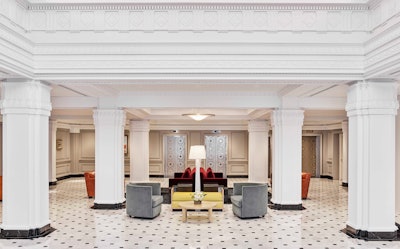
During the coronavirus pandemic, some hotels decided to close temporarily, while others remained open, accommodating healthcare workers or providing housing for the homeless. Now, more and more properties are opening their (no-touch) doors to leisure and business travelers, and making the necessary modifications to keep guests safe and healthy.
According to a recent survey conducted by the management consulting firm Oliver Wyman, 64 percent of respondents said that improvements in the cleaning of rooms and public spaces will significantly impact their decision to stay at a hotel. This is why hotels—large and small—are being transparent about their new protocols and showing off public-facing elements like social-distancing signage, Plexiglas partitions, and more.
This also includes stepping up their established hygiene and cleanliness procedures to adhere to local, state, and federal guidelines.
Setting Cleaning Standards
Many major hotel chains, as well as boutique properties, have recently introduced COVID-19 initiatives that include intensive cleaning and sanitation measures. In general, high-touch areas like light switches, thermostats, TV remotes, and door handles will receive extra attention, while items such as throw pillows and even minibars are being removed from rooms altogether.
For example, the Canvas Hotel in Dallas, which has already reopened, added sanitation stations throughout the property's public spaces and meeting rooms, increased the frequency of disinfection throughout the hotel, and has limited housekeeping services to vacant rooms or upon guest check-out. In May, Accor announced its “All Stay Well” initiative for properties in North and Central America. The new guidelines include a 48-hour “resting period” for guest rooms between stays.
Training Staff
The Hamilton Hotel in D.C. remained open as an essential business during the pandemic, and “in doing so, we've been challenged to look for creative ways to offer services to our local community and support our staff,” said Mark Driscoll, the hotel's managing director.
One of the property’s new initiatives is Hamilton University, a program that offers work-from-home training to its associates. Designed to keep staff engaged and employed during the shutdown, the “university” curriculum includes courses in hospitality and F&B such as barista certification, ServSafe certification, and second language lessons, plus COVID-related cleaning training.
Like others, Hamilton Hotel is adhering to precautions and preventive measures set forth by the World Health Organization (WHO), Centers for Disease Control (CDC), and American Hotel & Lodging Association (AHLA), along with state, federal, and local guidelines. For example, hotel employees have been trained to sanitize their workstation and any shared equipment before, during, and after each shift, including radios, keys, phones, computers, payment terminals, time clocks, carts, and more. Plus, they’ve been instructed not to shake hands but to use “non-contact methods of greeting.”
Revising and Adding Amenities
In order to limit contact, and thus potential exposure, hotels are rethinking common services and amenities such as on-site dining. For example, guests are now able to order items that are typically only available in a hotel’s dining room to be delivered to their rooms—or rather outside their rooms by the door.
And since gyms can be a breeding ground for germs, hotels are either keeping them closed or allowing guests to schedule private sessions when they can use the facility. The Canvas Hotel is offering a fitness suite option for guests who want to work out in their rooms; the suite comes equipped with a yoga mat, stability ball, resistance bands, fitness classes on demand, a jump rope, and more.
Plus, many hotels are offering personal care kits with hand sanitizer and masks upon check-in. And at the Bobby Hotel in Nashville, guests can do a Zoom call with the head concierge before their arrival to plan their itinerary minus the face-to-face contact. Also, keyless entry and virtual check-out are becoming standard options.
Maintaining Social Distancing
To adhere to that six-foot rule, properties are reconfiguring their public spaces and restaurants to allow for more space, and poolside lounges and beach chairs are being reduced and spread out to avoid crowding. The Hotel Indigo, which is located near the Raleigh-Durham Airport in Raleigh, N.C., is also alternating use of its rooms, so guest doors are more than six feet apart.
Plus, almost all hotels are operating at a lower occupancy rate to accommodate social distancing measures. Other strategies include scheduled check-in times to limit guest interaction and imposing a two guest per elevator ride policy.



















